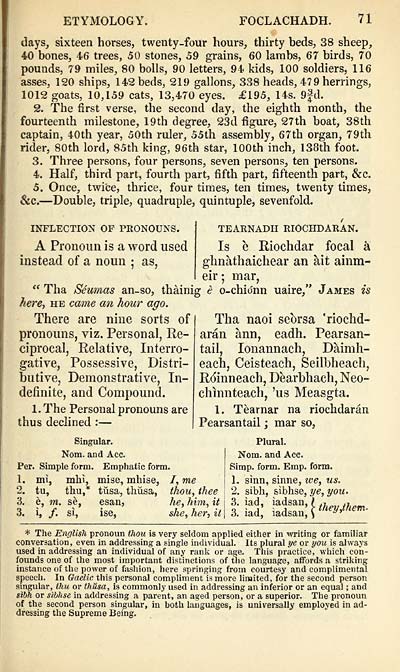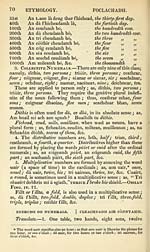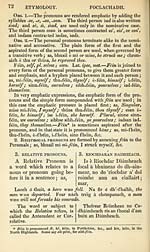Books and other items printed in Gaelic from 1841 to 1870 > Stéidhean a' Ghràmair Ghaëlig
(99) Page 71
Download files
Complete book:
Individual page:
Thumbnail gallery: Grid view | List view

ETYMOLOGY.
FOCLACHADH. 71
days, sixteen horses, twenty-four hours, thirty heds, 38 sheep,
40 bones, 46 trees, 50 stones, 59 grains, 60 larabs, 67 birds, 70
pounds, 79 miles, 80 bolls, 90 letters, 94 kids, 100 soldiers, 116
asses, 120 ships, 142beds, 219 gallons, 338 heads, 479 herrings,
1012 goats, 10,159 cats, 13,470 eyes. £195, 14s. 9fd.
2. The first verse, the second day, the eighth month, the
fourteenth milestone, 19th degree, 23d fìgure, 27th boat, 38th
captain, 40th year, 50th ruler, 55th assembly, 67th organ, 79th
rider, 80th lord, 85th king, 96th star, lOOth inch, 138th foot.
3. Three persons, four persons, seven persons, ten persons.
4. Half, third part, fourth part, fìfth part, fifteenth part, &c.
5. Once, twice, thrice, four times, ten times, twenty times,
&c. — Double, triple, quadruple, quintuple, sevenfold.
INFLECTION OF PRONOUNS.
A Pronoim is a word used
instead of a noun ; as,
TEARNADH RIOCHDARAN.
Is è Riochdar focal à
ghnàthaichear an àit ainm-
eir ; mar,
" Tha Sèumas an-so, thàinig è o-chidnn uaire," James is
kere, he came an hour ago.
There are nine sorts of
pronouns, viz. Personal, Re-
ciprocal, Relative, Interro-
gative, Possessive, Distri-
butive, Demonstrative, In-
definite, and Compound.
1. The Personal pronouns are
thus declined : —
Tha naoi seòrsa 'riochd-
aràn ànn, eadh. Pearsan-
tail, Ionannach, Dàimh-
each, Ceisteach, Seilbheach,
Ròinneach, Dèarbhach, Neo-
chìnnteach, 'us Measgta.
1. Tèarnar na riochdaràn
Pearsantail ; mar so,
Singular.
Nom. and Acc.
Per. Simple form. Emphatic form.
1. mì, mhì, mise, mhise, /, me
2. tu, thu,* tusa, thùsa, thou, thee
3. è, m. sè, esan, he, him, it
3. ì, /. sì, ise, she, her, it
Plural.
Nom. and Acc.
Simp. form. Emp. form.
L sìnn, sinne, we, us.
2. sìbh, sìbhse, ye, you
3. ìad, ìadsan
3. ìad, ìadsan,
they,ihem-
* The English pronoun thou is very seldom applied either in Avriting or familiar
conversation, even in addressing a single individual. Its plural ye or you is always
used in addressing an individual of any rank or age. This practice, which con-
founds one of the most important distinctions of the language, affords a striking
instance of the power of fashion, here springing from courtesy and complimental
speech. In Gaelic this personal compliment ismore limited, for the second person
singular, thu or thusa, is commonly used in addressing an inferior or an equal ; and
sìbh or sìbhse in addressing a parent, an aged person, or a superior. The pronoun
of the second person singular, in both languages, is universally employed in ad-
dressing the Supreme Being.
FOCLACHADH. 71
days, sixteen horses, twenty-four hours, thirty heds, 38 sheep,
40 bones, 46 trees, 50 stones, 59 grains, 60 larabs, 67 birds, 70
pounds, 79 miles, 80 bolls, 90 letters, 94 kids, 100 soldiers, 116
asses, 120 ships, 142beds, 219 gallons, 338 heads, 479 herrings,
1012 goats, 10,159 cats, 13,470 eyes. £195, 14s. 9fd.
2. The first verse, the second day, the eighth month, the
fourteenth milestone, 19th degree, 23d fìgure, 27th boat, 38th
captain, 40th year, 50th ruler, 55th assembly, 67th organ, 79th
rider, 80th lord, 85th king, 96th star, lOOth inch, 138th foot.
3. Three persons, four persons, seven persons, ten persons.
4. Half, third part, fourth part, fìfth part, fifteenth part, &c.
5. Once, twice, thrice, four times, ten times, twenty times,
&c. — Double, triple, quadruple, quintuple, sevenfold.
INFLECTION OF PRONOUNS.
A Pronoim is a word used
instead of a noun ; as,
TEARNADH RIOCHDARAN.
Is è Riochdar focal à
ghnàthaichear an àit ainm-
eir ; mar,
" Tha Sèumas an-so, thàinig è o-chidnn uaire," James is
kere, he came an hour ago.
There are nine sorts of
pronouns, viz. Personal, Re-
ciprocal, Relative, Interro-
gative, Possessive, Distri-
butive, Demonstrative, In-
definite, and Compound.
1. The Personal pronouns are
thus declined : —
Tha naoi seòrsa 'riochd-
aràn ànn, eadh. Pearsan-
tail, Ionannach, Dàimh-
each, Ceisteach, Seilbheach,
Ròinneach, Dèarbhach, Neo-
chìnnteach, 'us Measgta.
1. Tèarnar na riochdaràn
Pearsantail ; mar so,
Singular.
Nom. and Acc.
Per. Simple form. Emphatic form.
1. mì, mhì, mise, mhise, /, me
2. tu, thu,* tusa, thùsa, thou, thee
3. è, m. sè, esan, he, him, it
3. ì, /. sì, ise, she, her, it
Plural.
Nom. and Acc.
Simp. form. Emp. form.
L sìnn, sinne, we, us.
2. sìbh, sìbhse, ye, you
3. ìad, ìadsan
3. ìad, ìadsan,
they,ihem-
* The English pronoun thou is very seldom applied either in Avriting or familiar
conversation, even in addressing a single individual. Its plural ye or you is always
used in addressing an individual of any rank or age. This practice, which con-
founds one of the most important distinctions of the language, affords a striking
instance of the power of fashion, here springing from courtesy and complimental
speech. In Gaelic this personal compliment ismore limited, for the second person
singular, thu or thusa, is commonly used in addressing an inferior or an equal ; and
sìbh or sìbhse in addressing a parent, an aged person, or a superior. The pronoun
of the second person singular, in both languages, is universally employed in ad-
dressing the Supreme Being.
Set display mode to:
![]() Universal Viewer |
Universal Viewer | ![]() Mirador |
Large image | Transcription
Mirador |
Large image | Transcription
Images and transcriptions on this page, including medium image downloads, may be used under the Creative Commons Attribution 4.0 International Licence unless otherwise stated. ![]()
| Rare items in Gaelic > Books and other items printed in Gaelic from 1841 to 1870 > Stéidhean a' Ghràmair Ghaëlig > (99) Page 71 |
|---|
| Permanent URL | https://digital.nls.uk/101712787 |
|---|
| Description | Out-of-copyright books printed in Gaelic between 1631 and 1900. Also some pamphlets and chapbooks. Includes poetry and songs, religious books such as catechisms and hymns, and different editions of the Bible and the Psalms. Also includes the second book ever published in Gaelic in 1631. |
|---|

